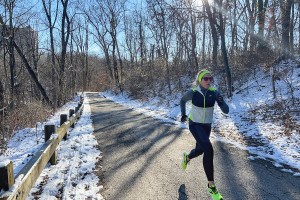Be Well Boot Camp Preview: I Really, Really Want to Start Running—But Where Do I Begin?
Broad Street’s just three weeks behind us, but a lot of runners are already thinking about next year. If you caught the running bug but have no idea where to begin, not to worry: Philadelphia Runner‘s Ross Martinson will at Be Well Boot Camp on June 8th to talk about how to go from your very first run to the finish line. He’ll also be on hand at the Moss Rehab Running Clinic, where he’ll work with doctors to give you one-on-0ne pointers about your mechanics, form and more.
Peep a few of Ross’s running insights below, and make sure to catch him at the “Conquer Your First 5K: A Running Primer” talk at Be Well Boot Camp. Get all you running questions answered—finally!
What seems to be the most common misconception people have when they begin running?
A lot of people think that they can’t run, or aren’t a ‘good’ runner. Just about everyone will say, “I’m not a runner.” Beginners say this, but so do people who have run marathons! One of the most satisfying things to hear as a coach is when someone says after a race, “Now I feel like a runner.” For new runners, the first few runs can seem daunting, but the amount a new runner will improve over just a few weeks is unbelievable.
Can you tell us a little about what you’ll be doing at the running clinic?
At the running clinic, we will be doing a gait analysis. Everyone has their own running style based on how their body is built and their athletic history. What we do is try to spot areas that could be improved, or might need additional support or strengthening.
What’s your best advice for new runners, or runners attempting their first 5K?
Pick a goal race and then plan how you will get there. Start with runs shorter than you think you can finish, and build up slowly. A common mistake is to run so much you are too sore for your next run. Consistency is the key to improvement. That and finding a friend who will drag you out on days you don’t want to run.
How about diet: what should we be eating before and after a run?
Planning your meals around your runs, such as making sure you eat a little something before a morning or post-work run, will help you feel better while running. Post-run, you don’t need to worry about refueling until your runs are over 90 minutes. Running burns around 100 calories per mile so there isn’t a need for most people to eat more than normal, especially if weight loss is one of your ultimate goals.
The idea of carbo-loading has been a pre-race mantra for a long time, but it isn’t necessary for shorter races. Don’t stuff yourself, eat healthy foods, lots of veggies, avoid fast food, and drink plenty of water.
And, finally, what every newbie is thinking: When does running get easier?!
If you run three days a week for three weeks, the distance you ran that first day (let’s say one mile) will be easy for you. But now you want to run twice that initial distance, and that will feel challenging. While it is important to take easy days to help you recover, your training should always include hard days to push you to longer and faster.
……….
Check out our full, jam-packed Boot Camp lineup here. And get your tickets while you’re at it, too. We’re expecting a sell-out, so get ‘em while you can!
Be Well Boot Camp is Philadelphia magazine’s and Be Well Philly’s annual girls’ day out for health and wellness. Boot Camp is on June 8th at the Drexel Recreation Center in University City. Tickets are $25 (or you can buy three and get one free!), and include all fitness classes, panel discussions, demos and more, as well as breakfast and lunch. Get tickets here.
Photo: Shutterstock


